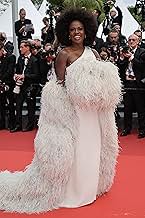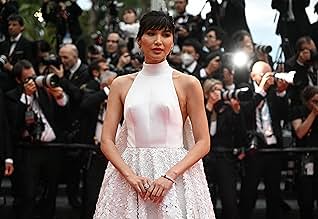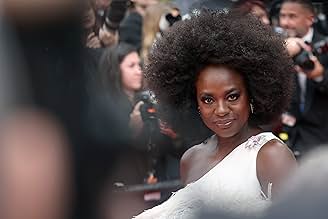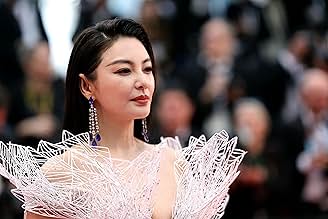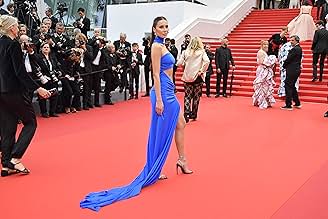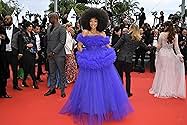A mother demands answers from her son's teacher when her son begins acting strangely.A mother demands answers from her son's teacher when her son begins acting strangely.A mother demands answers from her son's teacher when her son begins acting strangely.
- Awards
- 10 wins & 48 nominations
- Director
- Writer
- All cast & crew
- Production, box office & more at IMDbPro
Storyline
Did you know
- TriviaKoreeda said that all the characters in the film, to some degree, are imprisoned by invisible walls. "The mother is restricted by social norms, and the teacher is restricted by his manhood, as well as the school system. And the children are living in this world that the adults have created and they are affected by it, in terms of the violence that is perpetrated upon them. Yet they are able to escape it. It's as if the adults have been left behind, and the children have gone ahead and come to their own self-realization. I wanted it to be a positive realization."
Featured review
I'm a fan of Kore-eda's feature films, namely the more Stream-of-consciousness movies from the earlier part of his career - MABOROSI, THE AFTERLIFE, & DISTANCE are among my favorites of his work from the mid-1990s to the early 2000s. In his subsequent films that seem to focus even more on social commentary via a neo-realist approach to story telling, Kore-eda managed to show just how good he is in directing children with little to no experience in acting to shine in NOBODY KNOWS and THE MIRACLE. In between, he experimented with comedy (HANA), a twist of fantasy collaborating with non-Japanese actors and cinematographer in AIR DOLL, and then back to more social-commentary and plot driven - some were Melodrama-esque, kitchen-sink films, and others he dabbled in crime whodunnit stories... all of which except for MABOROSI he took charge with writing the screenplays highlighting the fact these were personal stories and messages he wanted to share through the art of Kore-eda cinema.
While the 2 most recent Kore-eda films were overseas collaborations, they seem to show Kore-eda does his best work in Japan, and MONSTER (KAIBUTSU) shows how Kore-eda can shine even when the story isn't penned by himself.
To fans of Kore-eda's earlier films I'd mentioned above, MONSTER is much more story and character driven, and the story is much more accessible than his films prior to NOBODY KNOWS. Many film critics have highlighted the RASHOMON-like approach to story telling. While the technique is similar, the point intended is very different from Kurosawa's use of POV story reveal - Kore-eda uses POV to reveal the truths in the story, while Kurosawa uses perspective story telling to show the audience there is no objectivity with human memories - people will choose to remember and recall memories that isn't necessarily true, but serves to protect their self-interests.
To me, MONSTER has all the heart, humanity, and social commentary that I love from Kore-eda films, but it almost is too accessible for it to be a Kore-eda story - fair to say it isn't his story as he didn't write the screenplay this time. It actually feels like a Shunji Iwai film to me, and some scenes in MONSTER reminds me of Iwai's ALL ABOUT LILY CHOU CHOU. The ending of MONSTER, to me, has a tone & manner that reminds me of Studio Ghibli films like ONLY YESTERDAY (not by Hayao Miyazaki but the late director Isao Takahata) - the messages, the social commentary, the music cues and clues to the ending (if you consider lens flare and changes to the set props) are all so clearly planted - in fact, I wouldn't have expected Kore-eda to feel the audience need to get the ending, but he seems to want to make sure we do through Easter-egg-type devices in the movie (Pay attention to scenes showing the train tracks if you don't know what I mean)...
Is Kore-eda back in good form after dabbling with his French and Korean collaborations? The audience is the best to judge, but being a Kore-eda fan, I enjoyed MONSTER even though I was hoping for a film with less of the planted clues/cues, and this is from me who don't mind the Ozu-esque long takes(MABOROSI, THE AFTERLIFE), 10+ minutes of seeing feet on grass being lost in the woods (DISTANCE), or dialog so subtle you could easily miss that one line about vengeful hate that will make your heart sink (STILL WALKING)...
Last but not least, MONSTER was awarded the Queer Palm prize at Cannes - while I have no intentions to provide a spoiler here, but by virtue of winning the Queer Palm, MONSTER is now considered to be endorsed by the LGBTQ community - the fact that one reaction from a character towards another in one scene can turn what is otherwise no more than fondness/comraderie for children into a sign of Romantic Love, that which for boys at that age when companionship doesn't need to be associated with the idea of romance, let alone sexual orientation and preferences to validate and distinguish (I'm thinking more Mark Lester & Jack Wild in MELODY (1971), the characters of Jean and Julien in Louis Malle's AU REVOIR, LES ENFANTS (1987) and not the characters of Leo & Remi in a much more B/Romance-Losses-Causes focused narrative in CLOSE(2022)) - that one reaction so deliberately planted into the one scene is to me very un-Kore-eda. In my opinion this was done to ensure the audience get the intention without any doubt - wasn't necessary and seemed too deliberate for a Kore-eda film... but then and again, he didn't write the screenplay, and this must have been written deliberately as a key plot-point so to broaden the audience appeal.
While the 2 most recent Kore-eda films were overseas collaborations, they seem to show Kore-eda does his best work in Japan, and MONSTER (KAIBUTSU) shows how Kore-eda can shine even when the story isn't penned by himself.
To fans of Kore-eda's earlier films I'd mentioned above, MONSTER is much more story and character driven, and the story is much more accessible than his films prior to NOBODY KNOWS. Many film critics have highlighted the RASHOMON-like approach to story telling. While the technique is similar, the point intended is very different from Kurosawa's use of POV story reveal - Kore-eda uses POV to reveal the truths in the story, while Kurosawa uses perspective story telling to show the audience there is no objectivity with human memories - people will choose to remember and recall memories that isn't necessarily true, but serves to protect their self-interests.
To me, MONSTER has all the heart, humanity, and social commentary that I love from Kore-eda films, but it almost is too accessible for it to be a Kore-eda story - fair to say it isn't his story as he didn't write the screenplay this time. It actually feels like a Shunji Iwai film to me, and some scenes in MONSTER reminds me of Iwai's ALL ABOUT LILY CHOU CHOU. The ending of MONSTER, to me, has a tone & manner that reminds me of Studio Ghibli films like ONLY YESTERDAY (not by Hayao Miyazaki but the late director Isao Takahata) - the messages, the social commentary, the music cues and clues to the ending (if you consider lens flare and changes to the set props) are all so clearly planted - in fact, I wouldn't have expected Kore-eda to feel the audience need to get the ending, but he seems to want to make sure we do through Easter-egg-type devices in the movie (Pay attention to scenes showing the train tracks if you don't know what I mean)...
Is Kore-eda back in good form after dabbling with his French and Korean collaborations? The audience is the best to judge, but being a Kore-eda fan, I enjoyed MONSTER even though I was hoping for a film with less of the planted clues/cues, and this is from me who don't mind the Ozu-esque long takes(MABOROSI, THE AFTERLIFE), 10+ minutes of seeing feet on grass being lost in the woods (DISTANCE), or dialog so subtle you could easily miss that one line about vengeful hate that will make your heart sink (STILL WALKING)...
Last but not least, MONSTER was awarded the Queer Palm prize at Cannes - while I have no intentions to provide a spoiler here, but by virtue of winning the Queer Palm, MONSTER is now considered to be endorsed by the LGBTQ community - the fact that one reaction from a character towards another in one scene can turn what is otherwise no more than fondness/comraderie for children into a sign of Romantic Love, that which for boys at that age when companionship doesn't need to be associated with the idea of romance, let alone sexual orientation and preferences to validate and distinguish (I'm thinking more Mark Lester & Jack Wild in MELODY (1971), the characters of Jean and Julien in Louis Malle's AU REVOIR, LES ENFANTS (1987) and not the characters of Leo & Remi in a much more B/Romance-Losses-Causes focused narrative in CLOSE(2022)) - that one reaction so deliberately planted into the one scene is to me very un-Kore-eda. In my opinion this was done to ensure the audience get the intention without any doubt - wasn't necessary and seemed too deliberate for a Kore-eda film... but then and again, he didn't write the screenplay, and this must have been written deliberately as a key plot-point so to broaden the audience appeal.
- fundaquayman
- Jun 27, 2023
- Permalink
- How long is Monster?Powered by Alexa
Details
- Release date
- Country of origin
- Official sites
- Languages
- Also known as
- Quái Vật
- Filming locations
- Kamaguchi Suimon, Nagano, Japan(Sluice Gate)
- Production companies
- See more company credits at IMDbPro
Box office
- Gross US & Canada
- $434,585
- Opening weekend US & Canada
- $25,603
- Nov 26, 2023
- Gross worldwide
- $20,658,945
- Runtime2 hours 7 minutes
- Color
- Sound mix
- Aspect ratio
- 2.39 : 1
Contribute to this page
Suggest an edit or add missing content




